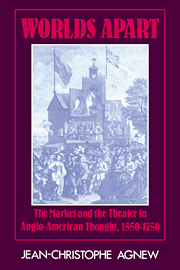3 - Artificial persons
Published online by Cambridge University Press: 16 November 2009
Summary
A Player is a representatif by his calling, a person of all qualities; and though his profession be to counterfeit, and he never means what he says, yet he endeavours to make his words and actions always agree. His labour is to play, and his bus'nes to turn passion into action – The more he dissembles, the more he is in earnest, and the less he appears himself, the truer he is to his professions. … He assumes a body like an apparition, and he can turn himself into as many shapes as a witch. … When he is off the stage he acts a gentleman, and in that only makes his own part himself. … He is like a Motion made by clockwork, the Poet winds him up, and he walks and moves till his part run down, and then he is quiet. … His profession is a kind of metamorphosis, to transform himself out of one shape into another, like a taylors sheet of paper, which he folds into figures.
Samuel Butler, Characters (ca. 1667–9)I am not that I play.
Twelfth Night, I, v, 184Thomas hobbes's interest in the theater as a model of authority had little or nothing to do with the stage's ancient emblematic status as a microcosm of the divine or natural order of things. The polity that he envisaged in Leviathan was a creature not of nature but of second nature, an “artificial man” whose aura of authority was no more (and no less) than an “artificial soul.”
- Type
- Chapter
- Information
- Worlds ApartThe Market and the Theater in Anglo-American Thought, 1550–1750, pp. 101 - 148Publisher: Cambridge University PressPrint publication year: 1986



